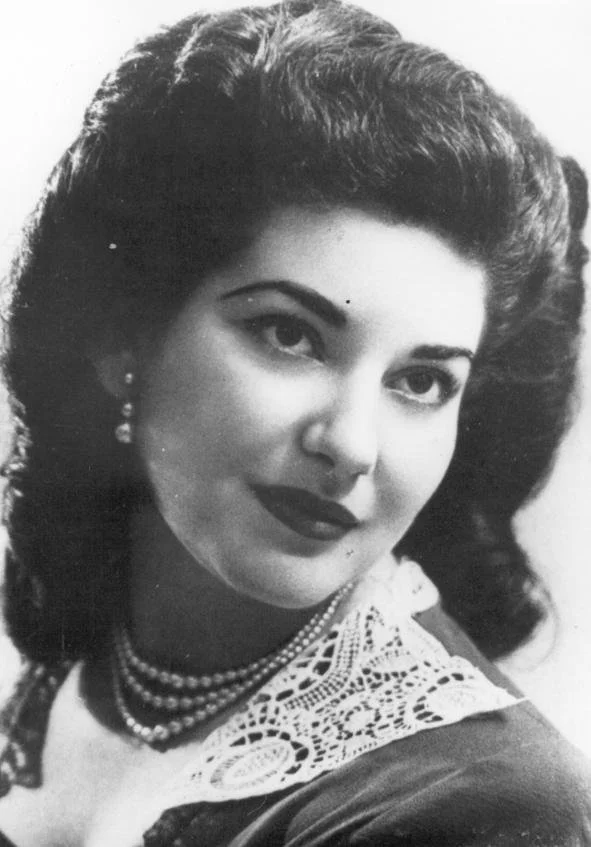Callas
/Callas – I have long treasured some comments made by the musicologist Stephen Johnson many years ago on Radio 3, while discussing the recordings of the great Russian cellist Mstislav Rostropovich: he initially remarked that when you hear recordings of Rostropovich you are always fully aware of this huge personality; he didn’t specify about this personality at the time, but to me the main qualities of Rostropovich are a unique garrulousness, full-heartedness, romanticism, generosity, and self-belief verging on arrogance. But Stephen Johnson wasn’t presenting this as a problem: what he went on to say was that these performances were so successful because that personality was “always in service to the music.” This has led me to ponder repeatedly over the years on the fact that in interpretive performance, such as in “classical” music in the broad sense, successful interpretation always involves a personality “in service to the music.” What we call a “huge personality” is merely a personality which has a particular conspicuousness, such as Rostropovich. There are many much “quieter” interpretive personalities, such as the pianist Murray Perahia, for example, but those personalities are just as fully present in performance, and real interpretation doesn’t take place without that presence.
Thus Rostropovich and Perahia are further examples of the phenomenon I’ve described with Glenn Gould: we get to the music in a crucial sense through the unique personality of the performer, and not in spite of it: it’s not that we need less of Rostropovich in order to get more of, say, Dvorak, for this is emphatically not a kind of zero sum game where you can only have so much percentage of performer and so much percentage of composer or composition. Interpretive arts obey a mathematics wholly different from this. So the more we get of Rostropovich the more we also get of Dvorak – Dvorak in one particular interpretation to be sure, but that single interpretation nevertheless takes us right to the heart of Dvorak’s music. And that is so even though there are an infinity of other possible performances that will take us to that core in an entirely different and unprecedented way, and reveal its other facets. (Here it will be seen that the metaphor of a “heart” or a “core” breaks down: Dvorak’s music is something that has an infinite number of facets, all of which are entirely itself. It is indeed a strange mathematics that operates here, as everywhere in existence in fact.)
For another, supreme example of this, consider Maria Callas. Having heard Callas sing ‘Casta Diva’ out of context, to then come to Bellini's Norma and hear that aria in context is initially disconcerting. This is an aria from early in the opera, when none of the tragic events that form the climactic denouement can even be anticipated. There is trouble brewing, but this is simply a beautiful, heartfelt plea to the moon to bestow peace on the turbulent sublunar world. Hearing Callas sing it, ‘Casta Diva’ sounds closer to the character of ‘Visse d’arte’ from Tosca, an aria that belongs to a moment when the tragic threads of fate have made it clear where they lead. Callas’s rendition works precisely because it is an anticipation: it implants the tragic destiny of Norma into her first extended expression, and we know in advance, whether we know the story or not, that this prayer for peace will be in vain, not just politically but personally too.
But what makes the interpretation unforgettable is that Callas is also singing the tragedy of her own life - even when that tragedy was itself yet to unfold. For Callas sang this aria, famously, early in her career as well as later, when she was a young singer on the up, with nothing disastrous having yet transpired in her personal life. But Callas had a tragic personality, a passionate commitment to the highest and best, both in her professional life and in her romantic entanglements, that was always going to come into fatal conflict with reality. We can recall Novalis’s famous saying that “character is fate” (as he in fact said: “fate and character are the same conception”); in some cases at least this rings true. And the more Callas’s singing evokes this very nub of her being and her destiny, the more effectively it gives us Norma as a character: if it was even possible for Callas to “forget” her own personality in order to give us more “purely” or “objectively” just the character of Norma the result would be a blank; or rather just a concoction of some abstract ideas about what emotions Norma might be experiencing, conveyed with artistry. What we have instead is this pulsing, utterly alive embodiment, Norma brought to life through the person, body and voice of Callas.
https://www.youtube.com/watch?v=DvtxVvT1Oqk&list=RDDvtxVvT1Oqk&start_radio=1
https://www.joewardpianist.com/diversions-on-the-way

